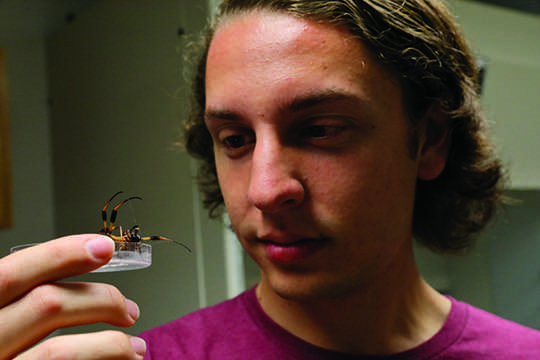Loyola senior receives full scholarship to Cambridge University to study spiders

March 27, 2017
Michael Pashkevich, biology senior, was awarded a full scholarship to Cambridge University, where he will focus his doctoral study on spiders and arachnids.
Pashkevich is conducting his ongoing honors thesis study at Jean Lafitte National Historical Park and Preserve, where he is examining how the conservation of deer in the preserve affects spider richness and abundance in the area.
Pashkevich was the only Louisiana applicant to receive the Gates Cambridge scholarship from over 800 U.S. applicants.
“I think humans are rather discriminatory in how they approach the conservation movement,” Pashkevich said. “There’s a whole other host of organisms that need to be conserved and there’s research suggesting if you conserve the large dramatic things, it could have an adverse effect on the smaller things that need to be conserved, as well.”
With the help of Aimée Thomas, assistant professor in the department of Biological Sciences, and several undergraduates, Pashkevich has collected and sampled 1,394 specimens from a plot of land that deer have access to and another plot of land that the deer have had no access to since 2006.
“Michael’s work is helping us understand the spider community at Jean Lafitte National Park as well as effective sampling techniques for a bottomland hardwood forest spider community,” Thomas said. “Our lab hopes to build upon his work with more research in the future.”
Pashkevich hated spiders until college. He only started to like spiders after going on a trip to Mississippi with Thomas to see what spiders were there.
“She plucked off of its web a large golden orb weaver spider, and just stuck it right on my arm,” Pashkevich said. “I was fascinated by the curiosity of it and the charisma that
it had.”
The hike in Mississippi is one of the excursions Pashkevich has done with Thomas, who has taken students to conduct tropical ecology studies in Belize, Guatemala, Ecuador and the Galapagos Islands.
“People tend to be afraid of animals and habitats they do not know,” Thomas said. “I try to engage students by exposing them to nature in a unique way, such as allowing a spider to crawl on your arm or lying down in the middle of a rainforest to experience nature in a
different manner.”
Out of the estimated 200,000 species of spiders around the globe, only 45,000 species have been documented.
“We’ve only found about a fifth of them,” Pashkevich said. “The scary thing about that is that research shows that spiders are going extinct at the same rate as large mammals.”
Pashkevich stated that while Louisiana is considered to be “well-studied” for its spiders, the state has not had a study on spiders done in 15 years.
“Since Katrina and other large scale ecological disasters, we haven’t actually seen what spiders are right here in our region,” Pashkevich said. “I’m also sort of just documenting what we have here and what quantity they’re present.”
At Cambridge, Pashkevich will be based out of the Museum of Zoology.
“I love getting younger kids excited about it [science] and try to encourage them to pursue a career in the sciences, especially if they’re from underrepresented backgrounds,” Pashkevich said.





